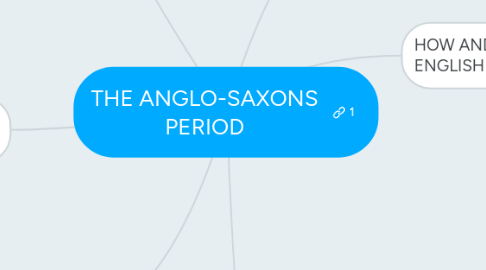
1. OLD ENGLISH
1.1. THE EARLY PERIOD
1.1.1. Languge spoken by the natives of the British Isles belonged to the Celtic family.
1.2. Celtics words were borrowed at the time and a few survive into modern english
1.3. Latin has been a major of influence on Englsh
1.3.1. Anglo_saxon tribesused Latin words . Latin words present in English at the beginning the saxon period.
2. WHAT HAPPENS TO A CONQUERED LANGUAGE LIKE CELTIC
2.1. Anglo saxons exterminated the Celtic people and the celtic Language.
2.2. celtics survivor escaped from England to the neighborings area of wales,Scotland and Ireland.
2.3. Britons are mostly Iberian,like the SPANISH
2.4. Celtic words survive in English WHISKEY from the celtic word of water of life
3. WHO WERE THE ANGLO SAXON
3.1. They were illiterate farmers ans pirates who practiced a pagan religion.
3.2. Some celts were Chritians, especially Ireland (beginning in the 4th century.
3.2.1. St. Augustine of Canterbury wnet to England with 40 onks as missionaries to convert the Anglo-Saxon to Christianity.
4. WHO LIVED IN ENGLAND BEFORE ENGLISH
4.1. Came from iberian peninsula
4.2. Neolithic Britian people began to live in communities and make stone temples, like Stonehenge (700 BC)
5. HOW AND WHEN WAS THE ENGLISH LANGUAGE BORN
5.1. The celtics Britons accustomed to living with Roman protection.
5.2. Germanic tribes were Jutes, the Angles and the saxons.
5.2.1. Call the invading Germanic tribes "Anglo -Saxons)
5.3. British king invited Saxon Mercenaries to come to Britain to defend the island againsnt of the other Saxon Pirates.
5.3.1. When they came they were stronger than Celts.
5.4. King Arthur fought the saxons a great battle in 500 A.D.
5.4.1. Arthur was dead ans Saxons invaded bRitain with no obstacles-
6. THE ANGLO-SAXON LITERATURE
6.1. The Origin
6.1.1. Old English has Germanic origins, basically a mixture of the dialects spoken by the most important AngloSaxon tribes that colonised England.
6.2. Most important composition
6.2.1. The Seafarer: a monologue of a sailor attracted by a loneliness and adventurous life at sea;
6.2.2. Beowulf:It celebrates and describes Germanic warrior society, outlining the strong relationship between the king, or lord, and his thanes, the latter ones pledged loyalty and service in defence of the king’s interest and in return they obtained provisions, weapons, armours, gold, silver, food and drinks. It was a society held together by strong family ties that firmly believed in the power of fate and destiny.
6.2.2.1. The Plot:
6.2.2.1.1. Beowulf, a warrior from Geats comes to the rescue of Hrothgar, the king of the Danes whose land is being attacked by a monster, Grendel. Beowulf succeeds and defeats Grendel. To show his prowess, he even kills Grendel with his bare hands. However, the tension of the story escalates, because Grendel's mother is now on the warpath to get revenge. As the story progresses, Beowulf kills Grendel's mother in her liar with a sword that giants of a past time once used. After this victory, Beowulf returns home to Geats. Fifty years pass. However, there is one final battle. There is a dragon that plagues his people because of stolen treasure. More importantly, Beowulf now has to defend his people. He fails at first, but then with the help of Wiglaf, a servant, chases the dragon into its lair and kills it. However, in the process, Beowulf receives a fatal wound and dies. Finally, he is buried by the sea.
